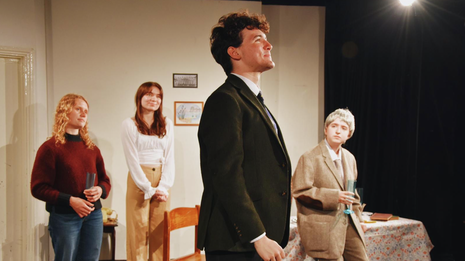Academic freedom vs scandal: An Open Book
Theatre Editor Sophie Macdonald speaks to the cast and crew of An Open Book about how Cambridge stereotypes transpire onto the stage

A Wildean fantasy that satirises Cambridge culture, An Open Book was inspired by an overdue library book. When writer Rosalind Moran discovered that the Guinness World Record for the most overdue library book is held by one borrowed from Sidney Sussex College in 1668, and not returned for 288 years, inspiration struck her. This piece of trivia delighted her so much that she decided she would write a play about “irascible librarians and academics with disastrous borrowing records (among other scandals).”
Centred around the life of Professor Ernest Gray, Rosalind explains that Gray “has just been promoted, tipped to become a Royal Society of Literature fellow, and is even capable of talking semi-competently with the object of his romantic affections.” Yet, when a “sinister St John’s College librarian - half mad with dreams of power, conquest, and chapel-to-library conversion schemes - blackmails him with relics form his wild youth,” continues Rosalind, “Gray is forced into quandary.” The play explores the tension between the old and new, tradition and innovation, in the context of academic freedom. Rosalind emphasises that An Open Book humorously portrays “academic competition” and the “pitiless, bone-dry Savannah of academic employment opportunity,” and riffs on the concept of “meritocracy.” Whether “it is possible for anyone to truly have a spotless, perfect, record” is carefully considered in the play, though, Rosalind promises it does so in a “funny way.”
“[It] does not neglect the human side of Cambridge, it uses Cambridge as an ideal setting to accentuate the key traits of each individual character”
Producer Isabella Ren also highlights that the play “captures the stereotypes of Cambridge without imposing monolithic prejudices on them.” She believes it is “quirky academic; the characters are ambitious, intelligent, and occasionally posh,” but, she insists, “the play does not neglect the human side of Cambridge, it simply uses Cambridge as an ideal setting to accentuate the key traits of each individual character, instead of letting this university define them.” Cambridge is the play’s “springboard […] but not it’s compass.”
“Ernest Gray is the glue that holds every character together,” claims Director Katie Kasperson. She highlights the farcical nature of the play and how it creates an intimate relationship with its audience by letting them in on secrets of which other characters aren’t aware. For example, Katie explains that only the audience knows “Ernest and Athena are secretly in love with each other” and that “the Librarian has a stronger connection to the characters than she lets on.” Ultimately, however, Katie comments that the characters are “ego-oriented figures that often plague academic environments,” so much so that the play could be considered a “Shakespearean comedy,” adding that it makes her “laugh more than anything else.”
“[It] reimagines and reconstructs the Cambridge experience”
Rosalind also highlights the debt that An Open Book owes to Oscar Wilde. Rosalind emphasises that she has “always admired Wilde’s wit and wordplay (as well as his great taste in menswear, but that’s a digression).” She enjoys the way “his plays hold together neatly and how they often retain a sense of levity, even when characters are digging themselves into holes.”
“The script pokes harmless fun, but does unveil quite troubling aspects of, not only academia, but its cosseted bubble”
Liv Bouton, who plays The Librarian, states that “academia is something we all participate in and absolutely must be laughed at.” She also loves the play for the way it reveals the truth. “The script pokes harmless fun, but does unveil quite troubling aspects of, not only academia, but its cosseted bubble,” claims Liv, before continuing that “the safety in sameness and regurgitating what has come before you prevents unleashing any kind of authentic self.”
“If there’s one thing Cambridge loves, it’s nepotism,” begins Isabella Duffy-Cross, who plays Athena, before describing her character as “the ultimate nepo-baby.” Isabella claims Athena is “ridiculously out of touch, definitely has a Freudian relationship with her dad, and has this obsession with moral goodness.” She also believes that An Open Book is a testament to “the culture we all operate in here at Cambridge,” and emphasises that the play lightheartedly “holds up a mirror” to the environment students exist in.
An Open Book is a play which promises to make its audience look introspectively through the beauty of satire. Will Ernest save his reputation, or will he, in true Robert Chiltern fashion, risk it all and “dare to be an open book?”
An Open Book by Rosalind Moran is showing 7pm in the Corpus Playroom from 17th – 21st May
 Comment / College rivalry should not become college snobbery30 January 2026
Comment / College rivalry should not become college snobbery30 January 2026 Features / Are you more yourself at Cambridge or away from it? 27 January 2026
Features / Are you more yourself at Cambridge or away from it? 27 January 2026 Science / Meet the Cambridge physicist who advocates for the humanities30 January 2026
Science / Meet the Cambridge physicist who advocates for the humanities30 January 2026 News / Cambridge study to identify premature babies needing extra educational support before school29 January 2026
News / Cambridge study to identify premature babies needing extra educational support before school29 January 2026 News / Vigil held for tenth anniversary of PhD student’s death28 January 2026
News / Vigil held for tenth anniversary of PhD student’s death28 January 2026











